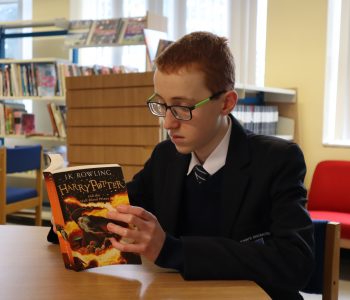-
Mr D Nelson
-
Mrs K McCrory
-
Mrs N Maguire
-
Mrs F Corry
English is for all. It is the right of each student who enters our school to experience an environment which develops their language skills in a secure and comfortable arena.
Every student will have the opportunity to develop a broad range of skills through the study of English. Through Reading and Writing, they will gain knowledge, understanding, pleasure, a sense of values and an ability to express their own feelings.
Through Speaking and Listening, pupils will engage with topical issues, alongside developing the ability to articulate their own feelings on a range of issues. Pupils will talk to teachers, in discussions, and in presentations.
Through English, pupils should leave school ready to encounter and confidently examine issues affecting them. Each child should be in possession of the skills to debate, discuss and challenge ideas, theories and issues which present themselves.
What will I study?
At Key Stage 3 language and literature are taught together. Students are taught to appreciate and produce language in a variety of contexts. Poetry, prose and media texts form an integral part of our teaching schemes. Pupils have six periods of English each week.
| Year 8 | Year 9 | Year 10 |
|---|---|---|
| Term 1: Novel
Term 2: Poetry Term 3: Short Stories |
Term 1: Novel
Term 2: Poetry Term 3: Short Stories & Media Unit ‘What’s on the Box?’ |
Term 1: Novel
Term 2: Poetry Term 3: Non-fiction and Media Texts |
How will I be assessed?
Students will complete formal assessment in June, with formative assessment throughout the year in the form of written tasks, reading exercises, and speaking and listening tasks.
Useful links
Students follow the CCEA Syllabus for GCSE English Language, with some students studying English Literature. Students undertake a range of Controlled Assessment tasks in Year 11 and Year 12, before completing terminal examinations at the end of Year 12.
What will I study?
Students will study one text as part of their Written Language requirement. They will study a range of Spoken Language material in preparation for their Spoken Language task. In planning for their terminal exams, they will examine a series of non-fiction and multi-modal texts.
How will I be assessed?
| What is it? | When is it? | How much is it worth? |
|---|---|---|
| Unit 1: Personal Writing and Reading Multi-Modal Texts | Terminal Exam Year 12 | 20% |
| Unit 2: Functional Writing and Reading Non-Fiction | Terminal Exam Year 12 | 20% |
| Speaking and Listening | Continuous Assessment | 20% |
| Unit 4: Controlled Assessment | Unit 4: Controlled Assessment | Unit 4: Controlled Assessment |
| Task 1: The Study of Spoken Language | Sept-Nov Year 12 | 10% |
| Task 2: The Study of Written Language | Sept-Dec Year 11 | 15% |
| Task 3: Writing Creatively | Jan-March Year 11 | 15% |
Every year some pupils are entered into Essential Skills as an alternative qualification if they are not able to access the GCSE course.
Why should I do this qualification?
You’ll gain a national qualification.
You can learn at your own pace.
You can learn in a group or on your own.
You’ll be given help to plan and present your work.
The tasks are learner-friendly and relevant to real life.
If you don’t pass a task, you can take a different task.
There’s lots of support available to you.
It’s never too late to learn
Useful links
http://www.rewardinglearning.org.uk/microsites/english_language/
http://www.bbc.co.uk/education/levels/z98jmp3
http://ccea.org.uk/qualifications/past_papers_mark_schemes/gcse

